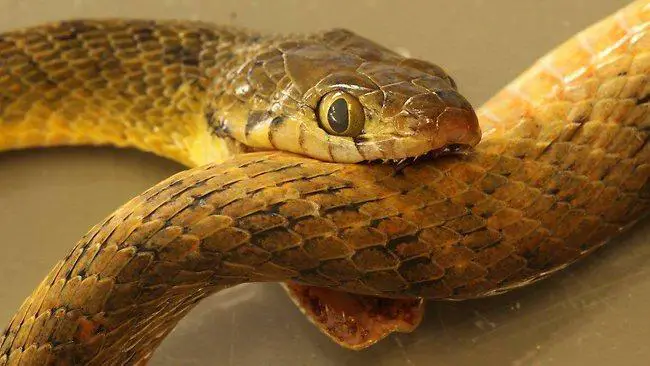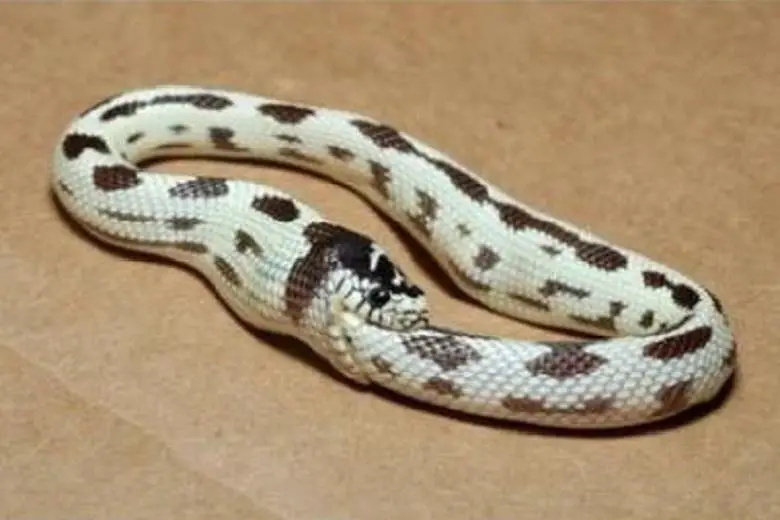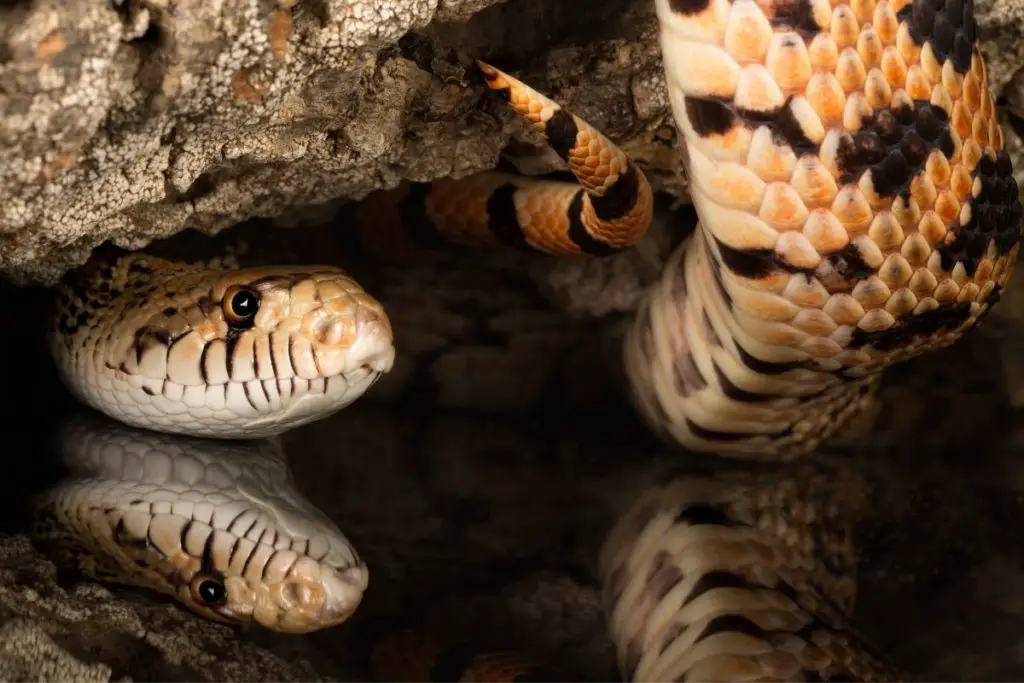You know that a snake can kill even large animals with a single bite and sometimes they do it without even injecting venom, but did you know that some snakes eat other snakes?
This begs the question; whether intentionally or unintentionally; can a snake bite itself to death? A snake can bite itself to death, but this is quite rare. Snakes are resistant to their own venom, and snakes do bite themselves for a few reasons including pain, but while the snake may not die from its own venom, it can die from the other effects of the bite.
The question of how a snake can bite itself to death and why it would even do that is a very interesting question with some even more interesting answers. In this article, we are going to discuss why and how would a snake bite itself to death.
Contents
Can a Snake Bite itself to death?

Animals which contain neurotoxins, the most powerful weapon in nature, are almost always immune to their own neurotoxins and can safely bite themselves.
After a cobra bite, virtually all animals except for the cobras themselves die within minutes as a result of the venom entering their circulation.
Neurotoxins bind to muscle receptors, preventing nerve impulses from causing muscular contractions and resulting in death. Vipers’ blood, on the other hand, can carry venom toxins and can quickly circulate the venom throughout their body.
So a snake can not die from its own venom, but it can still die if it bites itself for other reasons.
For example, the bite may cause a significant loss of blood, which could kill the snake.
The bite may also transmit bacterial or fungal infections right into the snake’s body or into the bloodstream where they could be fatal while they were not when they were just hanging outside the snake’s body.
Why would a snake bite itself?

Snakes bite themselves when they are overheated, hostile, overworked, hungry, or confused about what to eat.
Snakes may bite themselves out of sheer desperation when their eyesight is bad, for example, while shedding. They might also mistake their own tails for those of other snakes in a typical case of mistaken identification.
Here is a breakdown of why snakes bite themselves:
Stress
Stress is one of the most common reasons that snakes bite themselves. I’ve observed this in pet snakes more than wild ones, and much of it has to do with their living circumstances.
Snake ownership isn’t for everybody. Snakes are susceptible to stress, therefore they need certain living conditions and a habitat that caters to their specific demands.
The temperature and humidity are big factors in snake happiness. Snakes that live in excessively hot (or cold) environments will become confused.
When their tank is too little or too big, captive snakes will grow dissatisfied. They will protest when fed on an irregular basis, when they are handled too much, and the changes in light and dark are inadequate.
If you have a snake as a pet, the best rule of thumb is that a captive snake that you can’t see is one that is happy.
But knowing if your snake is happy or not can be tricky since they don’t make noises or show facial expressions, but If you are not sure if your snake is happy or not, you can learn how do snakes show happiness here.
Meal Confusion
The thrill of food might be another cause for your snake biting himself. This may look different for various snakes and circumstances, but it’s typical for lack of food to induce confusion, causing your snake to bite at anything that moves around him, including himself.
Consult your veterinarian to see if you need to change how you feed and how much. A snake might eat himself in order to survive when he is underfed.
This happens primarily in the wild, where a snake is unable to hunt owing to injury or sickness. Snakes can’t stop eating if their metabolism is too fast.
A snake may eat an entire nest of mice or moles in the wild since they are uncertain when they will next consume, and they are acting on instinct. In some cases, this primal drive might cause a snake to ingest itself.
Cannibalistic snake breeds, such as King Cobra’s, are never hesitant to feed on other snakes.
It might be a case of mistaken identity if you own or witness a cannibalistic breed of snake eating or biting its tail. When it happens, the snake will typically recoil in defense against the sting!
Aggression
Snakes that are aggressive because of their species or if they don’t have a lot of room to move might become aggressive.
Some snake species are more combative than others. Snakes are naturally antisocial, so your snake biting his own tail is probably an indication that he believes another snake is in his area.
Consider the size of your enclosure as it may be too small for them to roam.
Do Snakes kill themselves or commit suicide?

While snakes can be smart, they are not as smart as they need to be to commit suicide or kill themselves.
Their brains are smaller and less complex than mammals, birds or fish. Their central nervous system is not centralized in their head like it is with vertebrates such as humans.
Snakes can suffer from injury when they get stuck between rocks or branches while searching for food. They can suffer from disease or parasites, but they can’t knowingly kill themselves.
Snakes can bite their tails if they are stressed or confused about their environment, which might lead to injury since the tail is a sensitive part of them!
Conclusion
In a nutshell, snakes can and do bite themselves for various reasons, but they are unlikely to die from their own venom.
Snakes can die from their own bites but for other reasons like blood loss and infections, but it’s very rare for a snake to die from injecting itself with its own venom since all snakes that produce neurotoxins also produce antibodies that prevent the snake’s neurotoxins from killing the snake.
And although suicides have been observed in animal kingdom, it was not observed in snakes, and most experts and scientists believe that snakes are just not smart enough or have enough mental capacity to make such a decision even in dire circumstances.
Related Questions
Can a venomous snake bite without injecting venom?
A venomous snake can bite without injecting venom, and recent studies have shown that snakes have more control over their ability to inject venom than previously believed.
A dry bite is one in which no venom is discharged. A “venomous snake bite without envenoming” is a term used to describe a dry snake bite. Even though a dry snake bite may not be fatal, it can still cause discomfort, bleeding, inflammation, swelling, and/or erythema.
Do snakes bite themselves when injured?
Some snakes will bite themselves when injured to try and relieve the pain.
Helpful Resources
Brown tree snake found dead biting its neck
If you like this article, please share it!
